Blog
How Electric Vehicles are Reducing Carbon Footprints Real-World Impact
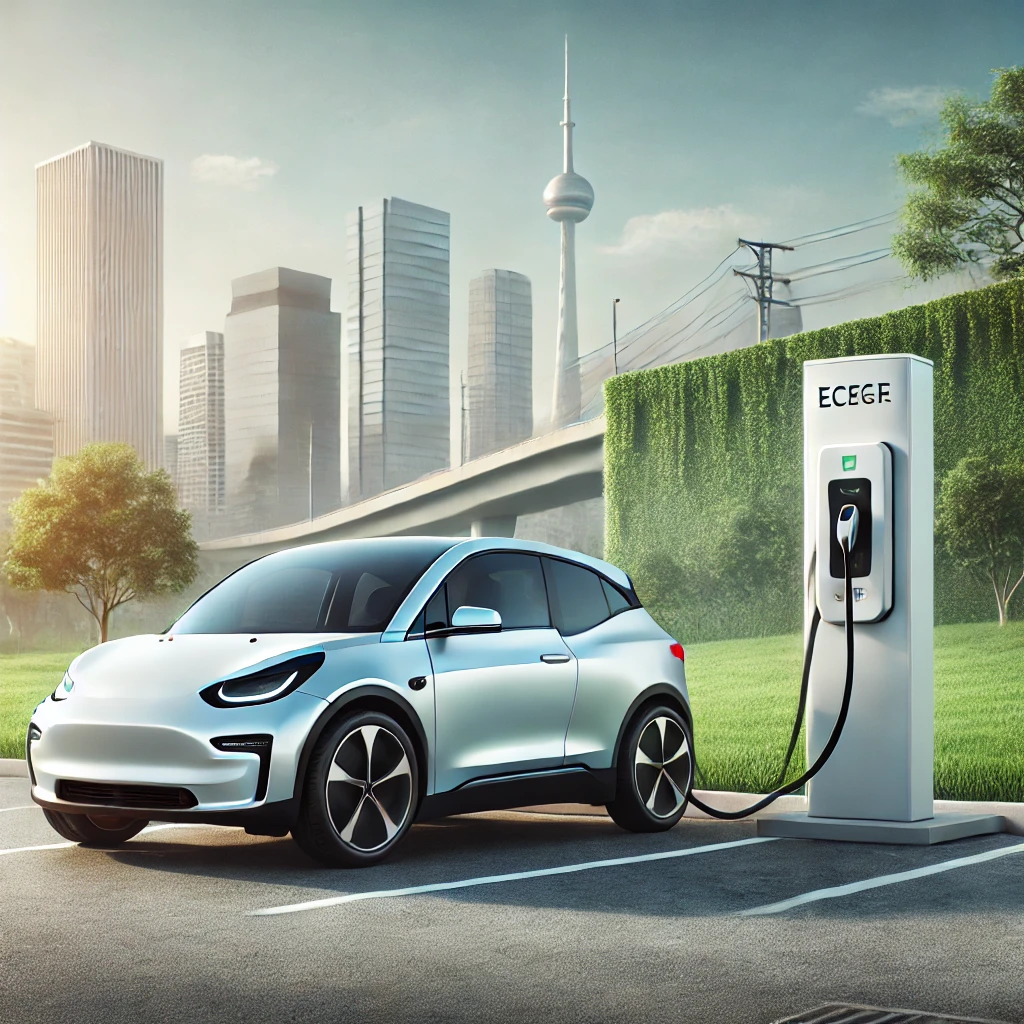
Electric vehicles (EVs) are no longer just a futuristic idea; they’re actively reducing carbon footprints and reshaping our approach to sustainable transportation. With increasing environmental concerns, more individuals and companies are choosing EVs as a cleaner alternative to traditional gas-powered cars. This shift isn’t just a trend—electric vehicles are making a real-world impact on reducing greenhouse gas emissions and promoting a healthier environment.
1. The Carbon Problem with Conventional Cars
Traditional internal combustion engine (ICE) vehicles are significant contributors to global carbon emissions. According to the EPA, transportation accounts for nearly 29% of all greenhouse gas emissions in the United States, with passenger vehicles being one of the primary culprits. When gasoline burns in an engine, it releases carbon dioxide (CO2), a potent greenhouse gas that traps heat in the atmosphere, accelerating global warming. EVs, however, offer a promising solution by reducing the need for fossil fuel consumption.
2. How Electric Vehicles Reduce Carbon Emissions
The transition to electric vehicles represents a powerful way to reduce our carbon footprints. EVs produce zero tailpipe emissions, meaning they don’t release CO2, nitrogen oxides, or other pollutants while driving. Instead of relying on gasoline, EVs run on electricity, which can be generated from cleaner sources like wind, solar, or hydropower.
Even when accounting for emissions from electricity generation, EVs generally have a smaller carbon footprint than ICE vehicles. For example, studies by the Union of Concerned Scientists show that EVs produce roughly half the emissions of a comparable gasoline car over their lifetime, including manufacturing and electricity usage. As renewable energy sources continue to grow, the carbon footprint of driving an EV will decrease even further.
3. Real-World Impact of Electric Vehicles on Carbon Reduction
The impact of EVs on carbon reduction is already visible worldwide. Countries like Norway, where over half of all new car sales are electric, have seen significant reductions in vehicle emissions. In the U.S., states like California, which offers incentives for EV purchases and has invested in EV infrastructure, are leading the way in decreasing transportation emissions.
Fleet electrification by companies also has an important role. Major corporations like Amazon, UPS, and FedEx are transitioning to electric delivery vehicles, which reduces emissions in logistics and sets an example for other companies. The collective impact of these actions contributes to a lower carbon footprint on a large scale.
4. The Future of EVs and Carbon Reduction
As battery technology advances, EVs are becoming more affordable and efficient, making them an accessible option for more consumers. Governments worldwide are investing in charging infrastructure, offering tax credits and rebates to encourage EV adoption. These policies not only help consumers transition to EVs but also accelerate their real-world impact on reducing carbon emissions.
The future is promising: as the grid moves towards renewable energy, the full potential of EVs in cutting carbon emissions can be realized. It’s estimated that by 2050, a global shift to electric vehicles could eliminate over one gigaton of carbon emissions annually—a significant contribution to the fight against climate change.
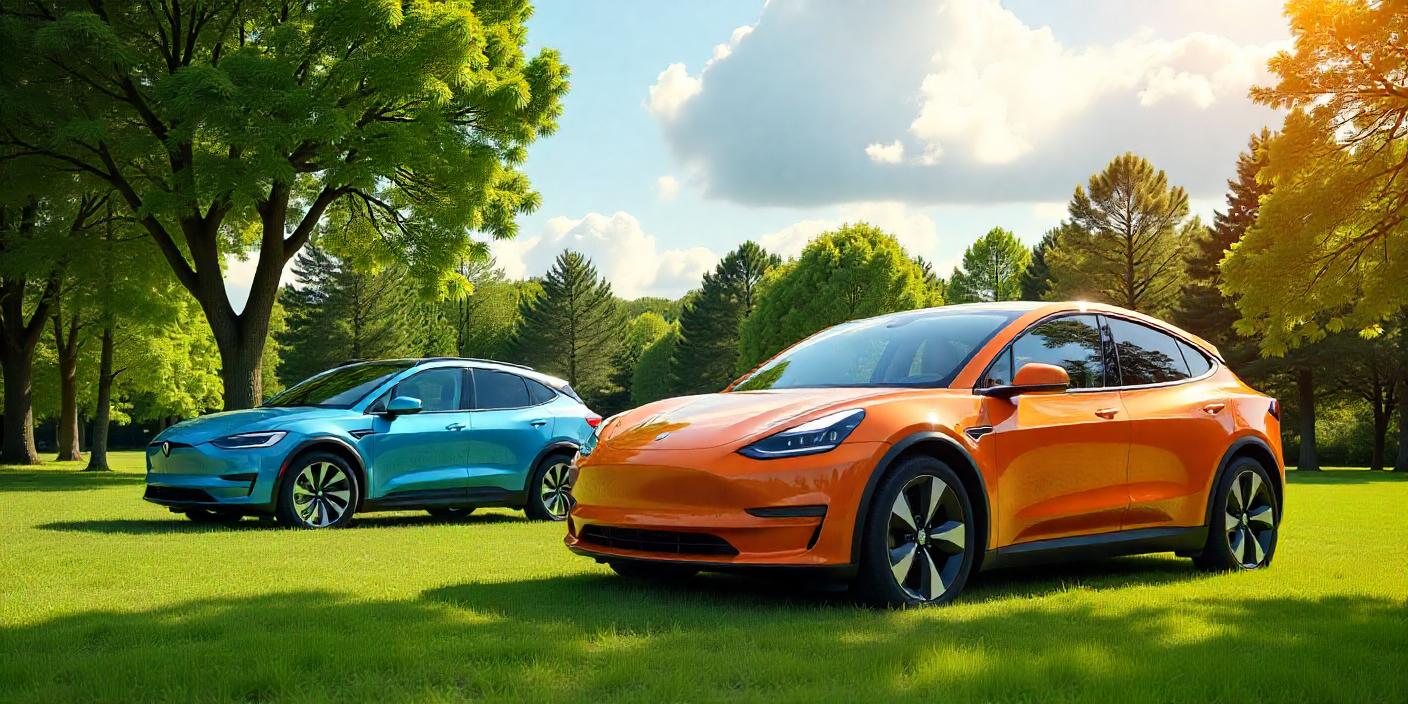
Conclusion
Electric vehicles are crucial in the global push to reduce carbon footprints and tackle climate change. Their real-world impact is growing as individuals, companies, and governments invest in clean transportation alternatives. By embracing EVs, we are collectively moving toward a greener future and reducing our carbon footprint, one mile at a time.
Article By
Prashant Sharma
Blog
EV Bikes vs Petrol Bikes – Which Saves More in 5 Years?
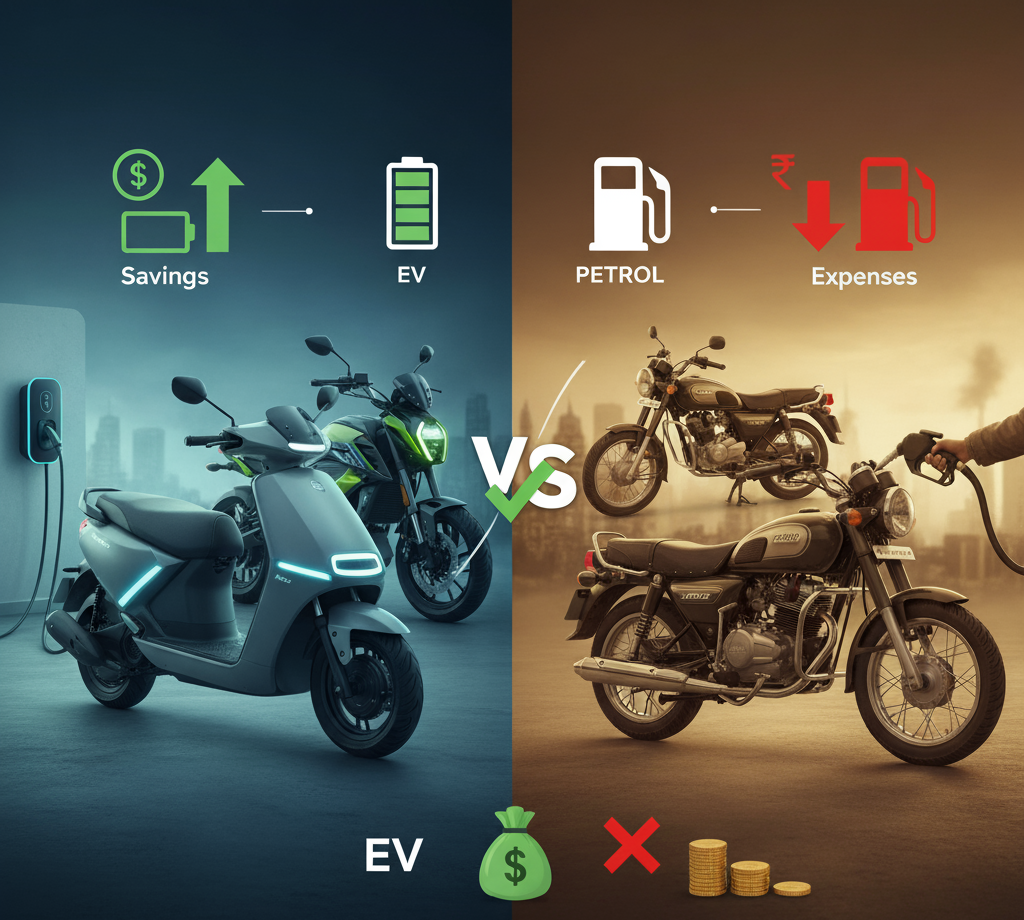
EV Bikes vs Petrol Bikes has become one of the hottest debates among Indian commuters today. Electric bikes in India are no longer futuristic concepts; they’re part of the country’s daily commute revolution, helping millions switch to a cleaner and smarter mode of transport. As fuel prices continue to rise and charging stations expand, many riders of electric scooters in India are asking the same question: “Will an EV bike really save me more money than a petrol bike in five years?”
The answer isn’t just about fuel costs-it involves purchase price, maintenance, government subsidies, and long-term ownership value. Let’s break down every factor to see which one truly offers better savings over time.
Purchase Price – EVs Cost More Upfront, But Why It’s Worth It
Petrol bikes remain cheaper at the time of purchase, but EV bikes come with higher upfront value and better long-term savings that make them more economical overall. For instance:
- Petrol bike (125 cc) average cost: ₹95,000 – ₹1.2 lakh
- Electric bike (mid-range) models like Ola S1 Air or Revolt RV400 are priced in the ₹1.2–₹1.5 lakh range (before subsidy). The competitive Ola bike price makes it one of the most attractive EV options in India’s two-wheeler market.
However, government incentives such as FAME II subsidies and state-level rebates (up to ₹20,000) reduce the gap. When you factor in zero road tax and low registration fees, the net on-road difference narrows to just ₹10,000 – ₹15,000.
So yes, the EV’s sticker price is higher—but this premium is recovered in the first 18 months through running-cost savings, clearly showing why EV Bikes vs Petrol Bikes is a conversation every rider should have before buying.
Running Costs – Where EVs Outperform
This is where electric two-wheelers in India truly shine, outperforming petrol bikes in efficiency, mileage, and per-kilometer running costs.
- Petrol bike mileage: ~45 km/litre
- Average fuel price: ₹105/litre → cost per km ≈ ₹2.3
- EV bike efficiency: ~30 Wh/km → cost per km ≈ ₹0.30 (assuming ₹6 per unit of electricity)
For a 30 km daily commute (900 km/month):
- Petrol bike: ₹2,070/month → ₹1.24 lakh in 5 years
- EV bike: ₹270/month → ₹16,200 in 5 years
That’s a saving of over ₹1 lakh in running costs alone—proof that in the EV Bikes vs Petrol Bikes comparison, electric bikes offer unmatched day-to-day efficiency.
Maintenance & Service – Simplicity Saves
EV bikes have fewer moving parts-no oil changes, no clutch, no carburetor, no exhaust.
Typical 5-year service cost:
- Petrol bike: ~₹12,000 – ₹15,000
- EV bike: ~₹4,000 – ₹6,000
Brake pads and tires are common for both, but EVs skip major engine services. Even the motor and controller rarely need attention if maintained properly.
Verdict: EV maintenance is 60-70 % cheaper than petrol.
Battery & Replacement Costs
Battery cost is the biggest concern for buyers. Most modern EV bikes use lithium-ion batteries with a lifespan of 5-7 years or around 60,000-70,000 km.
Replacement cost (if needed after 5 years) ranges from ₹35,000 – ₹45,000.
Even if you replace the battery once, your total expense remains lower—another win for EV Bikes vs Petrol Bikes when considering total ownership cost.
Tip: Choose brands offering battery warranty (3-5 years) and smart BMS systems that prevent overcharging and heat damage.
Insurance & Taxes
Electric bikes now enjoy lower insurance premiums and 0 road tax in most states.
Petrol bikes, on the other hand, attract higher long-term insurance and pollution-check charges. Over five years, this difference adds another ₹5,000 – ₹8,000 in EVs’ favor.
Real-World 5-Year Cost Comparison
The five-year data below makes it clear that in the EV Bikes vs Petrol Bikes debate, electric models lead in every cost category—from fuel to maintenance.
| Expense Type | Petrol Bike | Electric Bike | 5-Year Saving |
| Purchase (on-road) | ₹1,00,000 | ₹1,20,000 | – |
| Fuel / Charging | ₹1,24,000 | ₹16,200 | ₹1,07,800 |
| Maintenance & Service | ₹15,000 | ₹5,000 | ₹10,000 |
| Insurance & Taxes | ₹8,000 | ₹3,000 | ₹5,000 |
| Total (5 years) | ₹2,47,000 | ₹1,44,200 | ≈ ₹1,02,800 saved |
Owning an EV bike in India can save you over ₹1 lakh in five years compared to a petrol bike.
Environmental & Lifestyle Benefits
Besides monetary savings, EV bikes bring lifestyle upgrades:
- Zero tailpipe emissions: reduce your carbon footprint.
- Instant torque: smoother, quieter rides in traffic.
- Regenerative braking: adds 5-10 % extra range.
- Home charging: skip the fuel station altogether.
In a country with worsening air quality, choosing an EV isn’t just smart economics-it’s a responsible choice.
Challenges Still Facing EV Bikes
No technology is perfect.
- Charging time: 3-5 hours (compared to a 5-minute fuel refill).
- Charging infra: improving rapidly but still limited outside metros.
- Battery disposal: proper recycling systems are developing.
However, brands like Tata Power, Ola Electric, and Ather Grid are expanding charging networks across Indian highways and cities-reducing this gap every month.
The Break-Even Point Explained
If your daily run is above 25 km, you’ll reach your EV break-even in under 18 months.
If usage is light (10-15 km/day), break-even may take 2-2.5 years-but you’ll still save in the long term.
EVs reward consistent users; the more you ride, the cheaper every kilometer becomes.
Future Outlook – 2025 to 2030
By 2027, analysts expect the future of EV in India to accelerate rapidly, with electric two-wheelers crossing 40% of total new-bike sales thanks to dropping battery prices and improved infrastructure. With battery costs dropping and government incentives continuing, the ownership gap will disappear entirely.
Emerging tech like solid-state batteries and swappable energy pods will make EV bikes even more convenient and economical.
Conclusion – EVs Clearly Win in the Long Run
After crunching the numbers, it’s clear: Electric bikes save over ₹1 lakh in five years, cost less to maintain, and deliver a cleaner, quieter riding experience.
While petrol bikes still appeal for instant refueling and long-range travel, the financial logic is firmly shifting toward EVs-especially for city commuters and daily riders.
In 2025 and beyond, EV bikes aren’t just the future-they’re the smarter investment today.
Blog
Top 5 Electric Cars for Indian Families in 2025: Safety, Comfort & Long Range Compared

The year 2025 marks a defining shift in how Indian families view electric cars in India, as more households turn toward sustainable mobility options. Once seen as futuristic or expensive, family electric cars in India are now mainstream – practical, comfortable, and packed with smart safety features. With more than a dozen new models set to launch, families are finally spoilt for choice between compact SUVs, sedans, and multipurpose EVs that combine long-range capability with everyday usability.
If you’re a parent planning to switch to electric this year, this guide compares the top 5 models competing for the title of the best electric car in India for families in 2025, focusing on what truly matters – safety, comfort, range, and space.
Top 5 Family Electric Cars in India 2025
Tata Harrier EV 2025 – The Powerhouse SUV for Big Families
Expected Price: ₹27-30 lakh
Range: 500 km (claimed)
Launch: Mid-2025
Seats: 5
Tata Motors continues to lead India’s EV market, and Harrier EV 2025 is designed with large families in mind. Built on the new Gen-2 EV architecture, it offers a strong body structure, premium interiors, and the reliability Tata has become known for.
Why It’s Great for Families:
- Advanced ADAS (Autonomous Driver Assist System) for extra safety on highways.
- Dual-zone climate control and rear AC vents keep all passengers comfortable.
- Huge 445-litre boot space – ideal for family luggage and strollers.
- Panoramic sunroof and ventilated seats for long trips.
Verdict: Perfect for families who travel frequently or want an EV SUV that balances power with practicality.
MG ZS EV – Proven Performer with Premium Safety
Price Range: ₹23-28 lakh
Range: 461 km (ARAI certified)
Seats: 5
The MG ZS EV has been a consistent performer in India’s EV market, often ranked among the best electric cars in India for families who value premium safety and comfort. In 2025, the updated version brings improved range, new design cues, and an advanced safety package that makes it one of the most family-friendly EVs on sale.
Why It’s Great for Families:
- 5-star Euro NCAP safety rating.
- ISOFIX child-seat mounts and 6 airbags as standard.
- Smooth regenerative braking – safe and easy for new EV drivers.
- MG i-Smart system with voice controls for music, navigation, and AC.
Verdict: Ideal for city-based families who value safety and modern features without compromising comfort.
Hyundai Ioniq 5 – The Futuristic Family Cruiser
Price: ₹46-49 lakh
Range: 631 km (ARAI claimed)
Seats: 5
Winner of the “World Car of the Year” award, the Hyundai Ioniq 5 combines cutting-edge technology with an ultra-comfortable interior. Built on Hyundai’s global E-GMP platform, it’s one of the safest and most spacious EVs available in India.
Why It’s Great for Families:
- Flat floor design offers unmatched legroom and cabin space.
- Front seats recline fully – perfect for long drives or naps.
- 21+ safety features including lane-keep assist, blind-spot monitoring, and 360° camera.
- Supports 350 kW fast charging (10-80 % in just 18 minutes).
Verdict: The ideal premium family EV – futuristic design, superior comfort, and world-class safety.
Mahindra XUV400 EL – Long Range Meets Affordability
Price Range: ₹16-19 lakh
Range: 456 km (claimed)
Seats: 5
For Indian families who want an affordable yet feature-packed EV, the Mahindra XUV400 EL offers the right balance between price and performance. Its new “EL Pro” variant in 2025 brings software upgrades, better range, and refined cabin materials. The XUV400 EL shows how family electric cars in India are becoming more affordable without compromising on safety or practicality — making EV ownership possible for the average household.
Why It’s Great for Families:
- 6 airbags, ESP, and rear parking sensors as standard.
- 60:40 split rear seats and spacious boot for family gear.
- Smooth automatic drive makes city commutes stress-free.
- Android Auto & Apple CarPlay with large 10.25-inch touchscreen.
Verdict: Best option for middle-class families upgrading from petrol SUVs to electric.
Tata Nexon EV Long Range 2025 – India’s Favourite Family EV
Price Range: ₹16.5-20 lakh
Range: 465 km (ARAI certified)
Seats: 5
The Tata Nexon EV remains one of the best electric cars in India, known for its reliability, affordability, and family-friendly performance. The 2025 Long Range version adds better range, a refreshed infotainment system, and more focus on cabin comfort.
Why It’s Great for Families:
- Proven safety (5-star Global NCAP).
- Compact for city driving but spacious inside.
- 8-speaker JBL sound system and ambient lighting for family trips.
- Low maintenance and Tata’s wide EV service network.
Verdict: The most dependable choice for small and medium families switching to electric for the first time.
|
Model |
Price (₹ Lakh) | Range (km) |
Safety Rating |
Seats | Key Highlight |
| Tata Harrier EV 2025 |
27-30 |
500 |
5-Star |
5 |
ADAS + Big SUV Space |
| MG ZS EV 2025 |
23-28 |
461 |
5-Star (Euro NCAP) |
5 |
Premium Interiors & Safety |
| Hyundai Ioniq 5 |
46-49 |
631 |
5-Star (Global) |
5 |
Ultra Comfort + Fast Charging |
| Mahindra XUV400 EL Pro |
16-19 |
456 |
4-Star |
5 |
Affordable Long Range |
|
Tata Nexon EV LR 2025 |
16.5-20 |
465 |
5-Star (Global NCAP) |
5 |
Best All-Round Family EV |
The market for family electric cars in India is evolving rapidly, with brands like Tata, MG, Hyundai, and Mahindra introducing models that cater to every budget and lifestyle.
Key Factors Families Should Consider Before Buying an EV in 2025
While there are several family electric cars in India available in 2025, understanding your family’s driving habits and range requirements can help you choose the right EV that offers comfort and peace of mind.
- Safety First: Always look for cars with at least a 4-star NCAP rating, multiple airbags, ABS + EBD, and child-seat anchors.
- Comfort & Space: Rear-seat AC vents, adjustable headrests, large boot, and flat floors make a big difference on long drives.
- Range & Charging: Choose an EV offering a minimum 400 km range for city + weekend travel. Check your city’s electric vehicle charging stations and availability before finalizing your EV purchase – convenient access makes daily driving easier for families.
- Maintenance Costs: Electric cars have fewer moving parts – ideal for families wanting reliability and low upkeep.
- Brand Network: Brands like Tata, Mahindra, MG, and Hyundai now have dedicated EV service hubs across metros and Tier-2 cities.
How Family EV Ownership Is Evolving
In 2025, family EV buyers are not early adopters anymore – they’re mainstream users looking for comfort, safety, and convenience. The government’s FAME-II extension and state subsidies are further reducing upfront costs. Charging infrastructure has grown exponentially, with over 12,000 public chargers and more EV home chargers now active across India, making family EV ownership more convenient.
As automakers continue improving range and affordability, the growing benefits of electric vehicles – from lower running costs to eco-friendly performance – have made them the first choice for family cars in India. Today’s family electric cars in India offer much more than just eco-friendly driving — they deliver convenience, smart connectivity, and peace of mind for everyday use.
Final Verdict – Which EV Suits Your Family Best?
|
Family Type |
Recommended EV |
Why |
| Large families (5 + members) | Tata Harrier EV | Space + Safety + Long Range |
| Urban families (seeking premium comfort) | Hyundai Ioniq 5 | Silent, Spacious & Tech-Loaded |
| Budget-conscious households | Mahindra XUV400 EL Pro | Affordable yet practical |
| Small families (upgrading to EV) | Tata Nexon EV 2025 | Proven reliability & best resale |
| Safety-first parents | MG ZS EV | Top safety score & features |
Each of these EVs brings a distinct personality, but all five deliver what matters most – peace of mind, low running cost, and a cleaner drive for your family.
FAQs
- Which is the best electric car for Indian families under ₹20 lakh?
Tata Nexon EV Long Range 2025 and Mahindra XUV400 EL offer the best mix of range, features, and safety below ₹20 lakh. - What is the safest EV in India for 2025?
Both MG ZS EV and Tata Harrier EV 2025 feature 5-star safety ratings and advanced driver-assist systems. - How long does an EV battery last in Indian conditions?
Modern lithium-ion packs last 7-8 years or 1.6 lakh km, depending on usage and charging habits. - Which EV has the fastest charging time?
Hyundai Ioniq 5 supports 350 kW DC fast charging – 10 to 80 % in just 18 minutes.
The Future of Family Driving Is Electric
As 2025 unfolds, one thing is clear – electric cars are no longer niche or futuristic; they’ve become the most sensible family choice in India. Whether it’s safety, comfort, or range, today’s EVs meet every expectation of a modern household – from school runs and grocery trips to long weekend getaways. Ultimately, family electric cars in India are not just an eco-friendly choice but a smarter, long-term investment that brings safety, comfort, and savings for every household.
Models like the Tata Harrier EV and MG ZS EV prove that electric mobility can be as safe and spacious as conventional SUVs, while the Mahindra XUV400 and Tata Nexon EV make clean technology accessible to middle-class families. For those who want premium comfort and cutting-edge tech, the Hyundai Ioniq 5 sets a new benchmark altogether.
In short, switching to an EV in 2025 isn’t just an eco-friendly decision – it’s a smarter lifestyle upgrade that saves money, reduces maintenance worries, and ensures a cleaner planet for your children.
Blog
Tata Harrier EV Booking Process & Delivery Timetable for 2025

The Tata Harrier EV may be the large, daring electric SUV you’ve been waiting for designed for Indian roads. Tata Motors, already leading India’s EV space, is now ready to deliver something more powerful and premium than before. The Harrier EV combines everything people love about the Harrier – its strong body, road presence, and space – with a fully electric heart.
The New Tata Electric Car Era 2025
Tata has been quietly making waves with electric cars in India over the last couple of years. There was the Nexon EV, then the Punch EV, and now the Harrier joins the bandwagon. As opposed to tiny EVs, this one is an SUV true and proper – muscular, confident, and state-of-the-art.
What stands out immediately is the design. The front grille is sealed off for better aerodynamics, the lights stretch across the bonnet, and the overall look feels both elegant and intimidating. Step inside, and you’ll find a cabin that feels more like a lounge than a car – large screens, voice assistant, panoramic sunroof, ambient lights, and materials that feel soft yet solid.
This is not just an electric version of a present-day SUV. It’s a new chapter altogether in Tata’s EV saga.
Tata Harrier EV Range – Real Power Meets Real Distance
And now for the most thing that folks care about – range. Why have an electric SUV if it can’t travel far?
The Tata Harrier EV range would extend to 550 kilometers in a full charge. Even if you drive a little fast or hit traffic, you’d still be looking at figures more than 450 km. It’s not just about figures, though – it’s the liberation of being able to plan for a weekend getaway without having to worry about needing a charger every 50 kilometers.
In plain language: charge it once, and you’re sorted for the next few days.
Power delivery is instant – that’s the magic of electric motors. The Harrier EV will also offer dual motor All-Wheel Drive (AWD), which means it grips the road like a pro even when conditions get tricky. It’s smooth in the city, quick on the highway, and calm everywhere else.
Tata Harrier Price and Variants
While Tata hasn’t made any official announcement yet, insiders predict that the price of Tata Harrier EV will begin at approximately ₹28 lakh and will reach ₹35 lakh depending on the variant.
| Variant | Range | Expected Price |
| Standard | 450 km | ₹28–30 lakh |
| Long Range AWD | 550 km | ₹32–35 lakh |
When compared to other Tata electric cars 2025 price options, the Harrier EV is easily the brand’s most premium electric SUV to date. And yet, it’s still cheaper than most imported EVs offering similar range and features.
How to Book the Tata Harrier EV
If you’re planning to book one, the process will be smooth and quick.
- Go to Tata’s official EV website – Tata Motors Electric Vehicles
- Check the Harrier EV website when it goes live.
- Choose your variant and color.
- Provide your details and preferred dealership.
- Pay the booking amount – anticipated between ₹25,000 and ₹50,000.
Once you’ve booked, Tata will send you a confirmation and reminders of your delivery timeline. You can also make a face-to-face booking at your local Tata showroom if you’d rather speak to someone in person – some buyers prefer negotiating loan terms and pre-delivery slots in person.
Delivery Timeline for Tata Harrier EV 2025
According to reports, the delivery timeline of Tata Harrier EV starts officially from mid-2025, i.e., June-August.
Tata will be distributing cars in phases:
| Phase | Cities Covered | Timeline |
| Phase 1 | Metro Cities | June–August 2025 |
| Phase 2 | Tier-2 Cities | September–October 2025 |
| Phase 3 | Rest of India | November–December 2025 |
By that time, Tata Power’s charging stations will be available on highways and metro cities – it’s going to be a much more convenient affair to drive long distances on EVs.
Part of Tata’s Bigger Electric Future
The Tata Electric Cars 2025 lineup is humongous. The Harrier EV is only the beginning. The carmaker plans to launch more electric variants like:
- Tata Curvv EV: Cool, coupe-based SUV for young folks.
- Tata Sierra EV: Modern interpretation of the legendary Sierra.
- Tata Avinya: Luxury, futuristic, and for exports.
Together, they represent Tata’s strongest EV lineup to date – for all types of Indian motorists, from bargain-basement buyers to high-end SUV luxury seekers.
Why the Tata Harrier EV Deserves to Be on Your Radar
- Longest driving range in its category – up to 550 km.
- Dual-motor AWD system for enhanced control.
- DC fast charging support for 10–80% in 40 minutes.
- Roomy, feature-rich interior.
- Solid Tata after-sales support nationwide.
It’s a vehicle that doesn’t ask you to choose – range, performance, or comfort, your choice.
Be Among the First to Own the Future – Reserve Your Tata Harrier EV
The Tata Harrier EV is a blatant indication that India’s electric future has already begun, and the world is changing
Check out Tata Motors EV
To reserve the Harrier EV ahead of time and lead the way toward a cleaner future, visit Tata Motors EV or the showroom that is closest to you.
The future is quiet, powerful, and 100% electric.
Still Curious? Here’s Everything About the Tata Harrier EV
Q1. When does the Tata Harrier EV come out in India?
A.1.It is scheduled to go on sale between April-May 2025 with mid-year production commencing.
Q2. How much range does the Tata Harrier EV have?
A.2.You can expect a real-world range of 500–550 km per charge depending upon usage.
Q3. How much will the Tata Harrier EV cost in India?
A.3.The base variants would come in at ₹28 lakh with the top-end variants touching nearly ₹35 lakh.
Q4. Can I book the Harrier EV online?
A.4.Yes, there are bookings available on Tata’s official EV website or directly at the dealerships.
Q5. Does the Harrier EV have fast-charging?
A.5.Yes. It also supports DC fast charging up to 150 kW, which refills the battery from 10% to 80% in under 40 minutes.
Q6. What are the other Tata electric vehicles available in 2025?
A.6.The future cars are Curvv EV, Sierra EV, and Avinya under the Tata Electric Cars 2025 project.
Our Verdict on the Tata Harrier EV
The Tata Harrier EV is not just a car – it’s Tata’s statement that electric driving can be exciting, high-tech, and Indian. It’s big, bold, and built to take on the kind of roads most EVs shrink from.
If you’ve ever imagined cruising in a sporty electric SUV that’s equally at home in the city or on highways, now’s the time. The Harrier EV doesn’t just get you places – it gets the nation moving.
So go ahead. Visit your nearest showroom, meet the experts, and get the booking done.
Because the future isn’t coming – it’s already charging up in Tata’s factory.
-
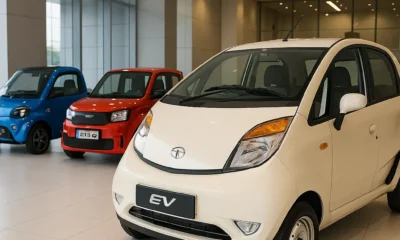
 Blog5 months ago
Blog5 months agoTop Electric Cars in India Under ₹5 Lakhs – Budget-Friendly EVs for Diwali 2025
-
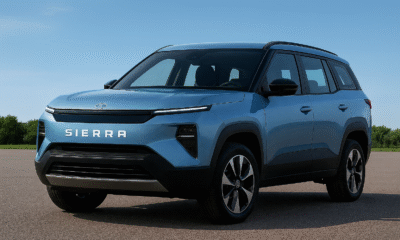
 Blog6 months ago
Blog6 months agoTata Sierra EV 2025 Launch: Price in India, Specifications & First Look
-
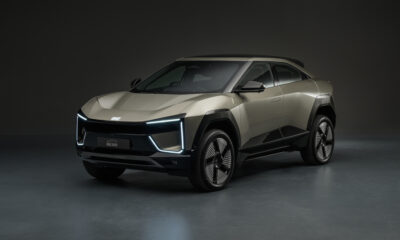
 Blog1 year ago
Blog1 year agoMahindra BE 6 An Intense Move toward the Fate of Electric Versatility
-
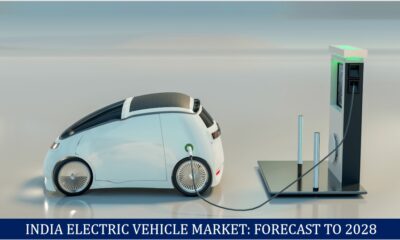
 Blog1 year ago
Blog1 year agoIndia’s Electric Vehicle Market Forecast to 2028 A Rapidly Growing Industry
-
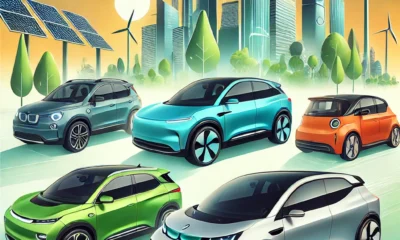
 Blog2 years ago
Blog2 years agoTop 5 best electric vehicles Under $30,000: Affordable Choices for 2024
-
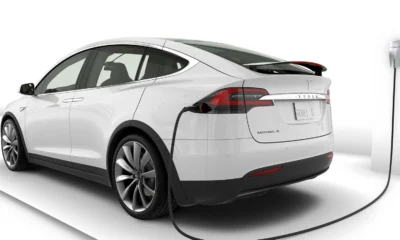
 Blog2 years ago
Blog2 years agoTop 10 Electric Vehicles of 2024: A Comprehensive Guide
-
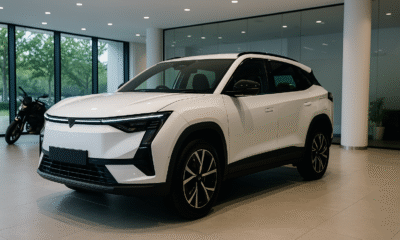
 Blog4 months ago
Blog4 months agoMahindra XEV 9e Launch in November Coming – Detailed Guide
-

 EV news1 year ago
EV news1 year agoAmpere Magnus Neo Another Time of Electric Portability




